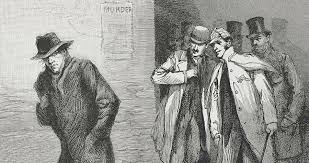In the late 1800s, a shadow loomed over London. An enigmatic serial killer known as Jack the Ripper terrorized the impoverished Whitechapel district. The mystery around his true identity still remains, leaving us with haunting questions. Who was Jack the Ripper? What were his motives? Let’s delve into the chilling tales behind seven of the most intriguing suspects.
Montague John Druitt: The “Son Of A Surgeon” Who Became A Jack The Ripper Suspect
Who was he?
Montague John Druitt, born in 1857, grew up in a privileged environment. He was intelligent, attending prestigious schools like Winchester College and New College, Oxford. Besides academics, Druitt excelled in cricket. After his education, he became a barrister in London and also taught at a boarding school. However, his dismissal in November 1888 for undisclosed reasons marked a turning point. Reports suggested he had “got into serious trouble at the school.” Shortly after his termination, Druitt disappeared. About a month later, in December 1888, his body was found floating in the River Thames, suggesting he had taken his own life.
Why is he one of the Jack the Ripper suspects?
Around the time of Druitt’s disappearance and death, Jack the Ripper targeted his final victim, Mary Jane Kelly. Rumors circulated that the Ripper had drowned in the River Thames. In 1891, Henry Richard Farquharson, a member of Parliament, claimed that Jack the Ripper was “the son of a surgeon” who committed suicide after the last murder. This statement gained traction as journalists, law enforcement officers, and public figures echoed the sentiment. Druitt’s father was a surgeon who also died by suicide in the Thames after Kelly’s death. Assistant Chief Constable Sir Melville Macnaghten even named Druitt as a prime suspect in his private memoirs in 1894.
Does the case against him hold up?
Unfortunately, the evidence against Druitt is mostly circumstantial. While many contemporaries suspected him, there is little beyond speculation linking him to the murders. Unlike the rumored medical skills of the true Ripper, Druitt had no training in medical techniques. His suicide seems more related to his fear of becoming like his institutionalized, depressed mother, as expressed in a note to his brother. With a family history of mental health issues, Druitt’s demise appears to be due to his own struggles. Some reports suggest he had alibis, either working or playing cricket during the murders. In the end, apart from his time and place of death and hearsay from law enforcement, there is little directly implicating Druitt.
The tale of Montague John Druitt serves as a reminder of the speculation and mystery surrounding Jack the Ripper. As we explore other intriguing suspects, we dive deeper into a labyrinth of secrets and stories that have captivated generations.
